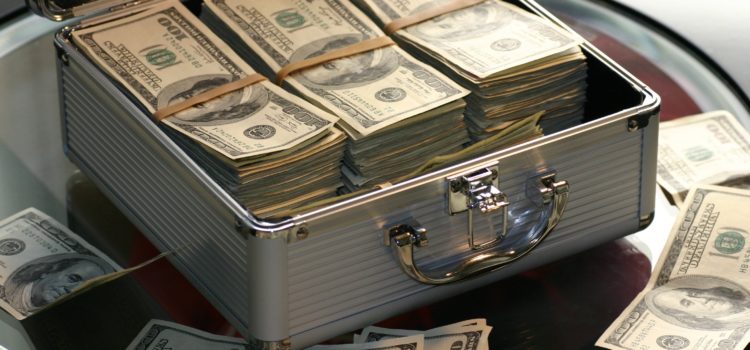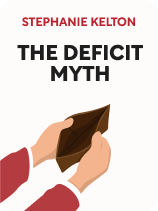

This article is an excerpt from the Shortform book guide to "The Deficit Myth" by Stephanie Kelton. Shortform has the world's best summaries and analyses of books you should be reading.
Like this article? Sign up for a free trial here .
Is the U.S. foreign debt a problem? Does China have economic leverage over the United States?
Despite popular belief, economist Stephanie Kelton says that foreign debt is not a problem for the United States. In fact, it may be China that has the real debt crisis.
Here’s why the United States shouldn’t worry about foreign debt.
The United States and Foreign Debt
Economist and author of The Deficit Myth, Stephanie Kelton disputes those who worry about U.S. foreign debt and highlight what they see as a particularly grave threat—the share of U.S. debt held by foreign countries like China. They often paint the picture of the U.S. being held hostage by foreign countries, the way a debtor might be if they borrowed from a loan shark.
But, Kelton writes, this narrative is also misleading. The U.S. doesn’t go to foreign countries on bended knee to beg for foreign loans. Instead, foreign governments and investors purchase U.S. treasury bonds using the dollars they acquired when American businesses and individuals purchased goods and services from their countries.
Kelton argues that the purchase of U.S. debt by foreigners is nothing more than an accounting adjustment at the Federal Reserve. When a foreign country (say France) purchases U.S. Treasury bonds, it’s effectively just converting its foreign dollar reserves into interest-bearing Treasury bonds, exchanging one type of U.S. financial instrument for another.
The Federal Reserve just debits France’s dollar reserves and credits its Treasury bonds account (because it’s depleting its supply of dollars to purchase Treasuries). Similarly, to pay the interest on those bonds, all the Fed does is debit France’s Treasuries and credit their dollar reserves (because they’re now receiving cash in exchange for the bonds they hold). All it takes is for someone at the Fed to strike a keyboard to adjust the accounts.
Some debt worriers argue that countries that own large quantities of U.S. Treasuries—like China—have leverage over the U.S. because they could theoretically decide to stop buying American debt and drive up borrowing costs.
Kelton writes that this argument also rings hollow. China’s economic policy is predicated on running large trade surpluses with countries like the United States (meaning it sells more to the U.S. than it purchases). In order to run those trade surpluses, it’s going to be holding onto large stocks of U.S. dollars. And if it holds large quantities of dollars, it’s going to need to find a safe investment to park those dollars. And there’s no safer place to invest dollars than in U.S. Treasuries, since, as we’ve explored, the federal government can always create the necessary dollars to pay the interest.
Therefore, China has no reason to sell off or stop buying U.S. debt. Doing so would inflict economic pain on them.
| China’s Debt Problem—and What It Means for the World In fact, it may be China that has the real debt crisis, not the U.S. In 2021, multiple property developers and real estate holding companies like Evergrande and Sunshine 100 China Holdings Ltd. began defaulting on their notes (denominated in U.S. dollars), sparking a downgrade of Chinese corporate debt by the major credit rating agencies. The concern among Chinese central bankers was that the slowing of China’s property boom, which began in the 1990s, would leave Chinese banks with unsustainable levels of debt that could cause an investor panic that would, in turn, spill over into the country’s nonfinancial sector. This could cause the Chinese economy to crash, which would have significant ramifications for global trade. Some critics note that China’s economic woes should be seen as the bill coming due for an aggressive growth strategy based on an abundant supply of cheap labor and state-backed debt that enabled the country to massively boost its exports; urbanize much of the rural population; and rapidly build its industrial and residential infrastructure at lightning speed. Yet despite the rapid development in China over the past few decades, too much of the population is still too poor to transition away from the old state-supported economy to an economy based on consumer spending—leaving China with an investment landscape saddled by unsustainable debt because there are not enough people to actually use and pay for everything that’s been built. Worryingly, the Chinese government has responded to these developments by reverting back to socialism and state control, which could cause international investors to lose confidence in the Chinese economy and massively disrupt the global supply chain, which is now inextricably linked to China. |

———End of Preview———
Like what you just read? Read the rest of the world's best book summary and analysis of Stephanie Kelton's "The Deficit Myth" at Shortform .
Here's what you'll find in our full The Deficit Myth summary :
- A look at national debt through the lens of Modern Monetary Theory
- How public discourse about national debts and deficits gets the facts wrong
- Why MMT says the U.S. government could finance any program it wishes to create






